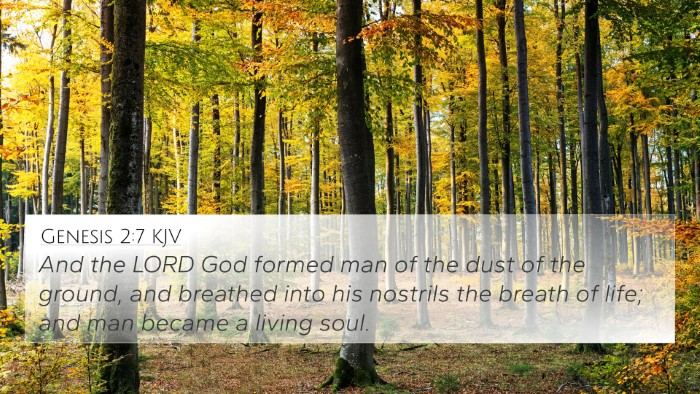Old Testament
Genesis Exodus Leviticus Numbers Deuteronomy Joshua Judges Ruth 1 Samuel 2 Samuel 1 Kings 2 Kings 1 Chronicles 2 Chronicles Ezra Nehemiah Esther Job Psalms Proverbs Ecclesiastes Song of Solomon Isaiah Jeremiah Lamentations Ezekiel Daniel Hosea Joel Amos Obadiah Jonah Micah Nahum Habakkuk Zephaniah Haggai Zechariah MalachiJob 27:3 Similar Verses
Job 27:3 Cross References
All the while my breath is in me, and the spirit of God is in my nostrils;
Uncover the Rich Themes and Topics of This Bible Verse
Listed below are the Bible themes associated with Job 27:3. We invite you to explore each theme to gain deeper insights into the Scriptures.
Job 27:3 Cross Reference Verses
This section features a detailed cross-reference designed to enrich your understanding of the Scriptures. Below, you will find carefully selected verses that echo the themes and teachings related to Job 27:3 KJV. Click on any image to explore detailed analyses of related Bible verses and uncover deeper theological insights.

Genesis 2:7 (KJV) »
And the LORD God formed man of the dust of the ground, and breathed into his nostrils the breath of life; and man became a living soul.

Job 32:8 (KJV) »
But there is a spirit in man: and the inspiration of the Almighty giveth them understanding.

Isaiah 2:22 (KJV) »
Cease ye from man, whose breath is in his nostrils: for wherein is he to be accounted of ?

Acts 17:25 (KJV) »
Neither is worshipped with men's hands, as though he needed any thing, seeing he giveth to all life, and breath, and all things;
Job 27:3 Verse Analysis and Similar Verses
Understanding Job 27:3
Job 27:3 states: "As long as my breath is in me, And the spirit of God is in my nostrils," This verse serves as a testament to Job's unwavering conviction regarding his integrity and the divine spirit within him. Below, we explore various theological insights derived from public domain commentaries alongside cross-references that illuminate its deeper meanings.
Meaning and Insights from Commentaries
Matthew Henry's Commentary
Matthew Henry interprets Job's declaration as an affirmation of life and divine influence. He emphasizes that Job acknowledges the presence of God's spirit within himself, suggesting a profound connection between humanity and the divine. This verse symbolizes the source of Job's strength in the face of adversity, reinforcing the idea that true righteousness prevails despite external trials.
Albert Barnes' Notes on the Bible
Albert Barnes elaborates on the importance of the breath of life, equating it to the spirit of God. He posits that this reference to breath signifies life itself, which is a gift that underscores the sanctity of existence. Job, through this assertion, indicates that while he lives, he will hold firm to his righteousness, thereby underlining a stoic defiance against any injustice he faces.
Adam Clarke's Commentary
Adam Clarke reflects on the idea that the spirit of God implies consciousness and the moral compass guiding Job. He suggests that Job’s declaration serves as a reminder of the ultimate authority of God's presence in his life. Clarke highlights that Job’s strong moral stance is intertwined with his acknowledgment of divine oversight, which empowers his resolve during the trials he faces.
Cross-References and Related Verses
Job 27:3 can be cross-referenced with several key Bible verses that explore themes of integrity, God's spirit, and the sanctity of life:
- Genesis 2:7 - "Then the Lord God formed the man from the dust of the ground and breathed into his nostrils the breath of life, and the man became a living being." This verse establishes the divine origin of life through God’s breath, connecting it directly to Job's assertion.
- Job 32:8 - "But it is the spirit in a person, the breath of the Almighty, that gives them understanding." This highlights the concept of divine influence on human wisdom and understanding, strengthening the portrayal of God's spirit in Job’s life.
- Ecclesiastes 12:7 - "And the dust returns to the ground it came from, and the spirit returns to God who gave it." This verse reinforces the idea of life stemming from God’s spirit, echoing Job’s recognition of that relationship.
- Acts 17:25 - "And he is not served by human hands, as if he needed anything. Rather, he himself gives everyone life and breath and everything else." This underscores God's role as the giver of life, paralleling Job's dependence on God’s breath.
- Romans 8:11 - "And if the Spirit of him who raised Jesus from the dead is living in you, he who raised Christ from the dead will also give life to your mortal bodies because of his Spirit who lives in you." This connects the themes of eternal life and spiritual vitality with Job’s acknowledgment of God’s spirit in him.
- Psalm 104:29-30 - "When you hide your face, they are terrified; when you take away their breath, they die and return to the dust. When you send your Spirit, they are created, and you renew the face of the ground." This illustrates the connection between God's spirit and the sustenance of life, reflecting Job’s statement about God's presence in his breath.
- John 20:22 - "And with that, he breathed on them and said, 'Receive the Holy Spirit.'" This New Testament moment emphasizes the ongoing connection between God's breath and the empowerment of his life-giving spirit.
Thematic Connections and Inter-Biblical Dialogue
Job 27:3 opens dialogues throughout the Bible that explore the intersection of spirit and existence:
- **Integrity Amidst Trials**: The linkage between Job's integrity during suffering and the steadfastness seen in other figures like Daniel (Daniel 6:10).
- **Breath as Divine Gift**: The representation of breath as a life force shared in various psalms, illustrating a broader theme of God’s nurturing presence in human life.
- **Righteousness vs Injustice**: Job's struggle with his friends and God mirrors the plight of figures such as Jeremiah, who contended with personal anguish while affirming God’s higher purposes (Jeremiah 20:9).
- **God’s Sovereignty**: The acknowledgment of God’s spirit within speaks to broader theological themes regarding God’s omnipresence and care (Ps. 139:7-10).
Using Cross-Referencing Tools
For anyone engaging deeply in scripture, utilizing a Bible concordance or a Bible cross-reference guide can enhance understanding of thematic connections. Tools for cross-referencing Bible study include specialized Bible reference resources that allow for deep dives into how verses interact and influence one another.
Conclusion
Job 27:3 encapsulates a fundamental truth about the intermingling of life, breath, and divine influence. By cross-referencing this verse with others, a richer understanding emerges that connects Job's experience to the overarching Biblical narrative of integrity, suffering, and divine life. Herein lies an invitation for believers to explore these connections, drawing deeper into the richness of God's word.



